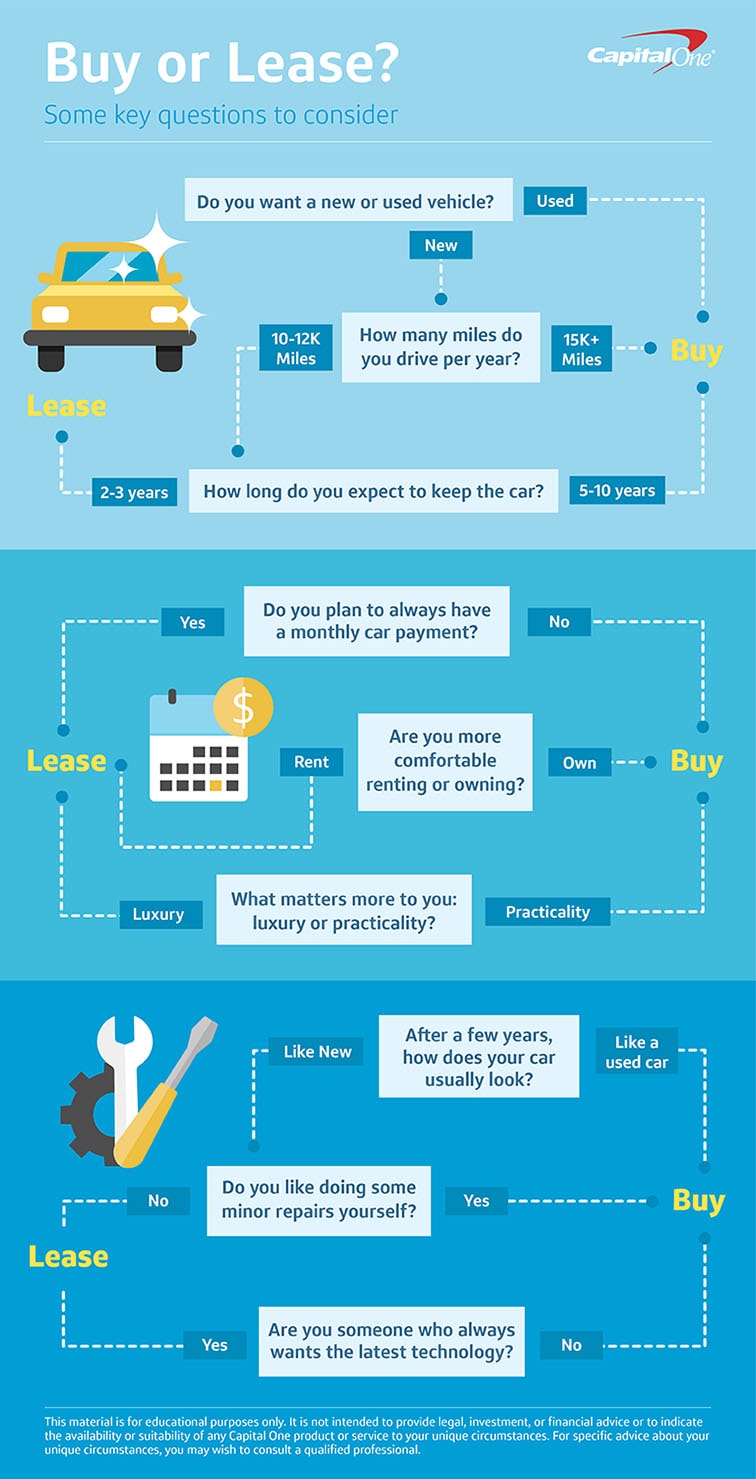Leasing vs. Buying a Car: A Flow Chart
How to find the answer that fits your financial situation and personality.
Capital One
Originally published on July 23, 2018
While it’s essential to examine practical matters, such as how many miles you drive in a year and how much you can afford to pay per month, there are also personal factors to consider, too.
For example, leasing might be right for you if you’re an early adopter who craves the absolute latest in technology. If you tend to hang onto old t-shirts until they’re falling apart at the seams, however, then buying is probably the way to go.
A little bit of self-awareness, balanced with some dollars-and-sense budgeting, should steer you in the right direction. If you're thinking "should I buy or lease a car," here are a few key questions to ask yourself:

THE PROS AND CONS OF LEASING A CAR
In the early 1960s, Ford, GM, and Chrysler all formed their own leasing companies. In the half-century that followed, consumers became comfortable with the notion of driving a new car for a few years—essentially paying the cost of its steepest depreciation—then returning it and starting over.
Nowadays,
Leasing pros:
- You get a new car more often.
- Typically, the vehicle is more luxurious and has more of the latest safety and technology features than you might be able to afford if you were buying.
- Lower monthly payments and less upfront costs compared to buying the same vehicle.
- Limited commitment (most leases last 24 or 36 months).
- Little or no repair costs, because leased cars are generally new and under warranty—and some are eligible for complimentary maintenance, too.
- You don’t have to worry about selling or trading-in the vehicle when the lease is up.
Leasing cons:
- Mileage is limited and fees apply if you go over (typically 20-25 cents per mile).
- Fees for excessive wear and tear are at the discretion of the dealer.
- If you need to get out of the lease before the agreed upon length, early termination fees can be substantial.
- You always have a car payment, and will never build equity in the car, even if you make a sizeable payment upfront.
- Leasing usually costs more than buying in the long run.
THE PROS AND CONS OF BUYING A CAR
Owning a car has been a powerful part of the American Dream for decades, and while it is not an investment that will appreciate in value, like a house, paying off an automobile is still considered an accomplishment.
Buying pros:
- You own the car, so you can modify it any time you want, whether that’s tinted windows, specialty wheels or a full-on reality show makeover (just make sure any changes you make won’t void the warranty).
- No restrictions on mileage, or wear and tear (...but keep in mind that excessive wear will adversely impact resale value).
- No monthly payments after the loan is paid off.
- You can sell the car whenever you want or use it as a trade-in on your next car.
- It is usually more cost-effective if you plan to keep the vehicle more than a few years.
- Monthly payments are typically higher because you’re paying for the entire car, not just two or three years’ use.
- Some lenders require a down payment.
- New cars depreciate (or lose value) quickly, which could be an issue if you only plan to own it for a short amount of time.
- You are responsible for all repairs and maintenance after warranties expire.
The decision of leasing vs. buying a car involves multiple factors. As you weigh the pros and cons of both options, it is helpful to consider your long-term goals of car use. Whether you go down the leasing road for short-term satisfaction or you’re in it for the long haul with a purchase will ultimately depend on what you value. If you’re still on the fence, you can choose the right road for you to finance your next car by doing more research and talking to a dealer.
Written by humans.
Edited by humans.
 Rick Press
Rick PressAfter a long career as an editor for a major metropolitan newspaper and website, in 2017 I joined Capital One as its Managing Editor for Auto Content. I’ve been fortunate to cover everything from breaking news and Super Bowls to CEOs and celebrities, and now I am excited to explore the connection we all have to our cars and help consumers navigate the car-buying journey. Let’s ride!
Related articles
View more related articles